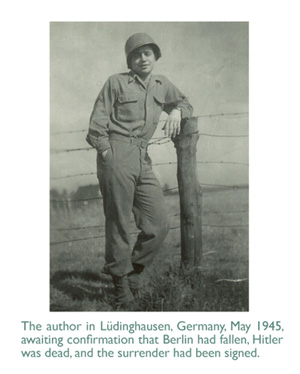A Humanist’s War Memory: “Spinach Music”
 Arriving in France on Thanksgiving Day, 1944, my outfit was scheduled to join the 9th Army in Holland for an assault crossing of the Roer River (Operation Grenade). Having arrived just in time for the German Ardennes Offensive—the Battle of the Bulge—we were suddenly in Patton’s Third Army, and on the “line” for the next three months. Finally, as we were spilling into the Rhineland, we began to feel like we were winning the war again as certain amenities of GI life returned: delousing, shower units, dry socks. And the USO began showing up.
Arriving in France on Thanksgiving Day, 1944, my outfit was scheduled to join the 9th Army in Holland for an assault crossing of the Roer River (Operation Grenade). Having arrived just in time for the German Ardennes Offensive—the Battle of the Bulge—we were suddenly in Patton’s Third Army, and on the “line” for the next three months. Finally, as we were spilling into the Rhineland, we began to feel like we were winning the war again as certain amenities of GI life returned: delousing, shower units, dry socks. And the USO began showing up.
One day, along with the chance to see a so-called Glamour Girl movie (again!), we had the option to hear a violin concert by Isaac Stern. Starved for good music, we mustered a truckload of cultural deviants to hear him instead of watching the movie.
The concert hall turned out to be a beat-up church that was still in air and artillery range. It had no lights and no heat. After waiting out the usual SNAFU, they finally brought the “maestro” out in an oversized GI overcoat, boots, and a tanker’s winter cap. He did have a violin, but it looked like we were going to get a clown act. Someone asked if the violin was his Stradivarius. “No,” he said, “like my wardrobe, it is government issue.” Then, to size up his audience (which was smaller than expected), he moved us all up close and asked for requests. A couple of inappropriate light tunes brought him to say, “Well, I’ll play what I think will be good for you. We’ll call it ‘spinach music.’” Then, with no accompaniment, only candles and a hand torch for lighting, in a GI overcoat, he played what was for us riveting music. No clown act—the effect for me was to slowly open a window on a rational world after the deadly insanity of winter warfare, giving us hope that we might survive to live in a civilized world again.
It took a huddle afterward to identify the music as Beethoven’s Violin Concerto. The immediate reaction was, “How come Kraut music?” When I heard that, I realized what the maestro was trying to teach us. The civilization we yearned for had contributions even from the hated enemy.
The barbarities I saw after we crossed the Rhine destroyed any faith in German humanity until well after the war. But every time I hear serious music (spinach music), Stern’s message comes back stronger. I shall always be thankful to Isaac Stern for risking life, limb, and health (but not his Stradivarius), for opening that window when we needed it most. Ever since, I always identify any serious classical music to my friends and family as spinach music. They mistake this for my usual sophomoric humor, but it often provides a chance to tell about the concert in the Ardennes and the universal affective power of music and the arts to covet culture for one world at peace.
